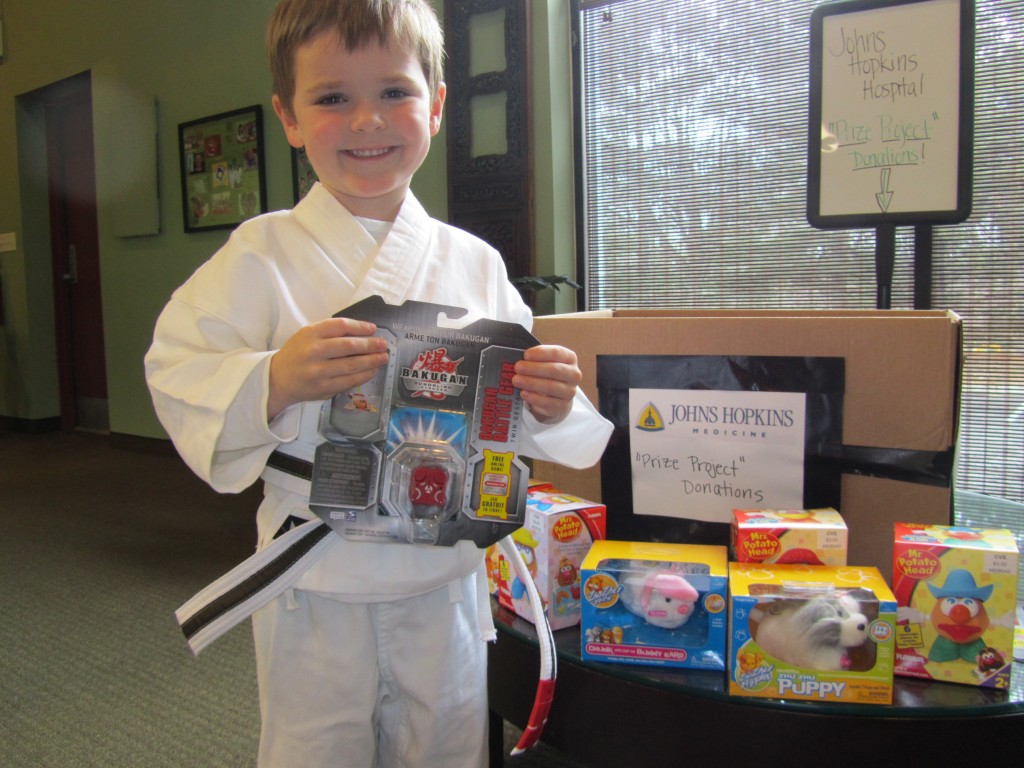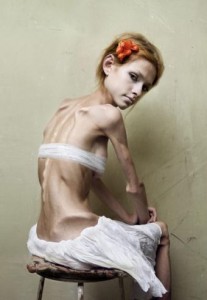Collin and his brother Gavin brought in all of these toys for the Prize Project. We talked about how happy the children who needed an operation at John Hopkins are going to be to choose one of these prizes.
Aiden C. Contributes Care Bears to Prize Project

After years of collecting these beautiful little bears, they are now going to be prizes for children who have undergone surgery at John Hopkins Pediatric Unit in Baltimore. Thanks to Aiden the children there will be comforted by these soft and cuddly gifts.

Dangerous Trends Facing Children: What Causes Eating Disorders?
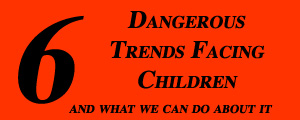 When we talk about confidence in oneself we must look at the idea of having confidence in our mind and body. For years now we have been learning more about eating disorders and how they affect some in our society. Each of us though can be a ‘gatekeeper’ in identifying and helping those who may be partaking in any of these destructive behaviors. How can we identify them?
When we talk about confidence in oneself we must look at the idea of having confidence in our mind and body. For years now we have been learning more about eating disorders and how they affect some in our society. Each of us though can be a ‘gatekeeper’ in identifying and helping those who may be partaking in any of these destructive behaviors. How can we identify them?
Anorexia nervosa – Those suffering with this BEHAVIOR do not eat enough food because they think they are too fat, even though they may be very thin.
Bulimia nervosa – Those suffering with this behavior will eat and many times overeat and then purge after overeating.
Binge-eaters – cannot control the amount of food they eat.
So how is it that individuals develop these behaviors? For many they do not see their behavior as being self-harmful, and were only trying to deal with or solve another problem. After doing some research here are the some of the most common causes of eating disorders:
- Major life transitions
- Family patterns and problems
- Social problems
- Failure at school, work or competitive events
- A traumatic event
- Major illness or injury
- Other psychiatric illnesses (triggered biologically, or previous obsessive compulsive symptoms)
It is not really known why some individuals might develop these disorders and others will not but given the list from above, there are things to consider that may help you see if a person or even yourself may have a propensity to develop an eating disorder. Continue reading “Dangerous Trends Facing Children: What Causes Eating Disorders?”
The 6 Most Dangerous Trends Facing Our Children Today
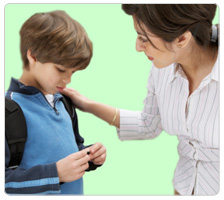 The world we live in is constantly changing and as parents it can be challenging to know what our children are facing and trying to deal with on an everyday basis. The way we were raised may have been good for the time that we lived in, but now is a different age and era with a whole new set of issues, ideas and challenges. Unfortunately our children are facing these challenges everyday and they may not have the words or the courage to tell us what is going on in their minds and hearts.
The world we live in is constantly changing and as parents it can be challenging to know what our children are facing and trying to deal with on an everyday basis. The way we were raised may have been good for the time that we lived in, but now is a different age and era with a whole new set of issues, ideas and challenges. Unfortunately our children are facing these challenges everyday and they may not have the words or the courage to tell us what is going on in their minds and hearts.
This may not be the lists that ends all lists, but I believe it gets to the root of many of the issues that our children are having to deal with. So what are the trends that our children are dealing with? Not in any particular order I have placed these. You may think your child is not dealing with some of them. That may be true and then again maybe not. As you consider each of these and look at the references and further reading I encourage you to stay close to your child, talk to them without judging, build a community around them, help them feel like they belong to something that is bigger than them.
Here is the list of our 6 Most Dangerous Trends Facing Our Children Today. Continue reading “The 6 Most Dangerous Trends Facing Our Children Today”
Life Skills: Building Confidence in Mind and Body
 Recently I completed a list and investigation into the top 6 trends that were most dangerous to our children today. I must say that it is not just our children, but in fact adults too that must deal with these 6 dangerous trends. One of the trends that students of all ages must deal with is low self confidence.
Recently I completed a list and investigation into the top 6 trends that were most dangerous to our children today. I must say that it is not just our children, but in fact adults too that must deal with these 6 dangerous trends. One of the trends that students of all ages must deal with is low self confidence.
How is it that our children go from being able to do anything that their minds can imagine at the age of 3 & 4 to feeling that they are not “smart enough”, “good enough”, “thin enough”, “successful enough”, in such a short period of time? As each child gets older they many times are influenced by the opinions of others as their method of measuring themselves. As they listen and watch those in their circle of companions, they begin to believe that this is how they should look, act, and be.
It is that “self talk” that can make us feel horrible about our bodies and mind. One of the influences that everyone of us must combat is the influence of the media. Yet the portrayal of the models and lifestyles of the celebrities many times is created in unnatural and fake ways that does not relate to the real world or maybe even that person.
Build Confidence In Your Body
Your body can do some amazing things. Your body is different than anyone else. We can be confident in our bodies and who we are, what our skills are, and how we approach our life. That does not mean that we should not take care of ourselves. It does mean though that the world of fake looks and lifestyles should not be our goal. Our goal can be to continue to make positive changes in ourselves through eating healthy, getting regular exercise, and getting the sleep we need. It means hanging out with kind and thoughtful individuals, developing our knowledge and points of view, and not being skewed by those that want to sell us something.
Visit this blog regularly as the 6 Most Dangerous Trends Facing Our Children Today is coming soon!
What parents can do about childhood bullying?
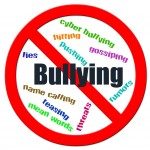 In general, bullying behavior in school can be different when dealing with boys and girls. This is a rather general statement, so there will be times when they can be the same. While both boys and girls will experience bullying by being made fun of for the way they look, act or speak, boys will experience hitting, pushing and bumping more often than girls.
In general, bullying behavior in school can be different when dealing with boys and girls. This is a rather general statement, so there will be times when they can be the same. While both boys and girls will experience bullying by being made fun of for the way they look, act or speak, boys will experience hitting, pushing and bumping more often than girls.
On the other hand the bullying in school by girls will be an experience of exclusion, having rumors spread, and sexual comments from both boys and other girls. In fact while boys will target both girls and boys with bullying behavior, generally girls will more often target other girls. In fact there is a term, relational aggression, that is used to describe their behavior that is so harmful against each other.
So what should we do if we suspect bullying is going on? This is the time to stay calm and draw them out with questions that may encourage them to speak about their experiences and feelings. Being aware of changes in their pattern of behavior, such as not hanging out with someone who was a close friend, or not wanting to go to school, or walk home from school is very important for us as parents. Many times our children will not want to discuss what is going on, not because they do not want to, but they may be embarrassed or feel like it is their fault.
So when we hear their feelings we must be careful too, not to pass it off too quickly or minimize the bullying by asking them to “just let it go”, or “it will get better”, or making excuses for the individual that is behaving in a way to hurt the feelings or them physically. What our child needs may not be advice as much as validation about how they are feeling at that moment.
We will want to allow our child to express how they are feeling, what their concerns are, and do our very best to understand what is going on. We as parents want to help, in fact sometimes too much, and in so doing we get in the way of our child’s growth and personal development in conflict resolution and learning to solve their own problems that they face.
In the past many of us, including myself have given our children advice on bullying prevention like, “Just ignore the bully”, “When they start picking on you, just walk away.”, or “See if you can stay with a group of friends and they won’t pick on you then”. Kids know that these are quick fix phrases that adults like to use, and while they are valid, there is other work that must be done first.
This is such a difficult thing for us to see as parents, but now is the time to remain calm and respond to our children’s needs and listen to how they are feeling. The way you listen, hopefully calmly and thoughtfully, will determine if your child will want to or will talk to you about this issue in the future. Be supportive, suggest that you are willing to help your son or daughter to find some other ways of dealing with the problem of bully prevention. This is the time to acknowledge with your child that this is a difficult problem and that you know that their is no easy fix, but that you are willing to continue thinking about it and talking to them about how they can solve the problem.
You can and should come back to the conversation and see what sort of strategies your child is trying and what the response of the other person has been. You are there to help, it just may not be the time to try to jump in and try to fix it yourself. Now is the time to give your child the tools they need to prevent bullying without your intervention. Is this difficult? YES! In the long run though it is the best and the right thing to do unless there is imminent physical threat.

